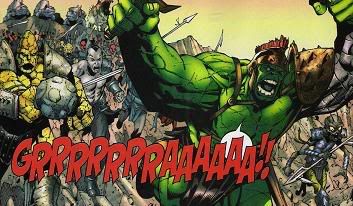As much as I disagree with the idea of a Marvel-wide Crisis, I can’t help but wonder if a specific section of the mythology couldn’t use a little Superboy-meets-wall treatment: namely, Marvel’s cosmic characters.
And that may seem like a stupid thing to say considering that Annihilation, perhaps Marvel’s biggest cosmic event since the days of Starlin’s various Infinity series (or, to be more precise, since the days that Starlin’s Infinity series had any impact on the rest of the MU) is already in full-swing. After reading all the Annihilation books published so far, however, it seems to me that the event is further proof that the problem exists rather than a solution to it.
I was expecting both more and less from Annihilation. By "less," I mean that I wasn’t expecting to enjoy it as much as I have. Annihilation: Nova is certainly the most impressive of the prequel books, and I would be either genuinely surprised or unsurprisingly disappointed if the event doesn’t lead to an ongoing monthly for the character (hopefully with the same creative team as Annihilation: Nova). As Joel Hunt says over at Sleep is for Suckers: "Yes, Nova is basically Peter Parker in the Green Lantern Corps…but damnit, that’s not a bad concept to hang a character on." Annihilation: Silver Surfer doesn’t seem that much different or more interesting than the character’s previous series, but Renato Arlem’s art more than makes up for it. Annihilation: Super-Skrull is fun though not particularly memorable, and Annihilation: Ronan is the worst of the bunch, managing – in only four issues – to be as confusing as any dense crossover from either of the Big Two. Utilizing the Seven Soldiers model served the Annihilation prequels well, giving this cosmic war the kind of grandness such a story deserves, whereas in previous eras something like this would probably have been breezed through in one or two issues of Silver Surfer or Fantastic Four.
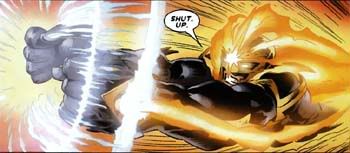
But, by saying I was expecting more, I meant that I was expecting something appreciably different about the particular characters and Marvel’s cosmic canvas as a whole. I was expecting some kind of redefinition of the thing. On that front, Annihilation simply hasn’t delivered. The only significant difference I can see is that villains like Drax, Super-Skrull, and Ronan are being treated as protagonists; and heroes like Nova and Silver Surfer have become much darker and, specifically, much more willing to kill. We’re not exactly going where no comic book has dared to go before.
I started to tune into exactly what it was that bothered me about Marvel’s cosmic stories while reading Annihilation: Silver Surfer, as two new characters – Tenebrous and Aegis – were introduced. The two are old enemies of Galactus and are freed during the attack of the Annihilation Wave. After a bit of reflection, I realized that my issue with Marvel’s cosmic stories is the same problem the Christians had with the pagans.
TOO. MANY. FUCKING. GODS.
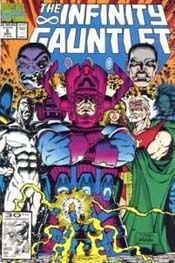 I’ve never followed the cosmic books as much as the kind of fans who can draw up charts to show how the Living Tribunal can bitch-slap Eternity or vice-versa. Still, ask me to name as many cosmic characters I can off the top of my head, and most of them will be the kind of Beyonder-level characters who seem to be able to do just about anything. It seems like there are more omnipotent-y characters in Marvel’s cosmos than just your average super-guys. The gods are legion in space, there’s too many to name, and no matter how indefinable and powerful they are, all of them seem to manifest their powers in the same way: as ‘splody laser beams shooting of their hands and/or eyes.
I’ve never followed the cosmic books as much as the kind of fans who can draw up charts to show how the Living Tribunal can bitch-slap Eternity or vice-versa. Still, ask me to name as many cosmic characters I can off the top of my head, and most of them will be the kind of Beyonder-level characters who seem to be able to do just about anything. It seems like there are more omnipotent-y characters in Marvel’s cosmos than just your average super-guys. The gods are legion in space, there’s too many to name, and no matter how indefinable and powerful they are, all of them seem to manifest their powers in the same way: as ‘splody laser beams shooting of their hands and/or eyes. I think the relative lack of cosmic stories in recent years has made the problem worse. I imagine that when Silver Surfer was coming out every month, the writers knew they couldn’t just spit out a new uber-god each issue. Now, with the rarity of cosmic stories, it seems like the writers feel that they need to create a new I-can-eat-your-planet-and-fart-a-solar-system character in order to make the thing feel as BIG as possible. In fact, I can’t think of one post-2000 cosmic story that didn’t introduce such a character. There’s the aforementioned duo in Annihilation: Silver Surfer, Stormbreaker: The Saga of Beta Ray Bill had some uber space demon as well as some invisible god guys who resurrected Bill for no discernible reason, Infinity Abyss featured some freaky Thanos clones and one of them – if I remember correctly – was a mix between Thanos and Galactus, Entropy from the first story arc of Captain Marvel’s final volume, and then there was that Pharaoh dude from Marvel Universe: The End. Being all-powerful is as commonplace in Marvel’s cosmos as having superpowers is in Top Ten.
(SPOILER WARNING: I’m about to reveal a significant Annihilation plot point.)
And just like wearing a cape means less than nothing in Neopolis, being a god in Marvel’s cosmos doesn’t mean a damn thing, and the proof is in the stories. The first issue of Annihilation ends with what may be the death of Galactus. Probably not, but if he is in fact dead, who cares? How many times has he died at this point? Yeah, you could say the same thing about most Marvel characters, but most Marvel characters don’t eat fucking planets. The integrity of a character like Galactus depends on his NOT being killed every other time he shows up. Likewise, in spite of the rarity of cosmic stories these days, I can think of exactly two 21st century appearances of Eternity, and in both cases (Captain Marvel and the Giffen/DeMatteis Defenders mini) he was killed.
None of this is to say that Marvel’s cosmos shouldn’t have a rich pantheon of gods in sci-fi clothing. But it seems to me that the pantheon is overcrowded and, worse, the idea of a godlike character is being diminished by overuse. A while back I wrote a post about how the various Star Trek series ran into creative dead-ends and constantly fell back on time travel as a plot device. Marvel’s cosmic stories suffer from something similar. Just about every cosmic story has something to do with a new god rising and trying to kill an old god, and no matter who wins – since no one stays dead in comics – the result is too many fucking planet-eaters. Marvel’s cosmos should have its gods, but being a god should mean something.
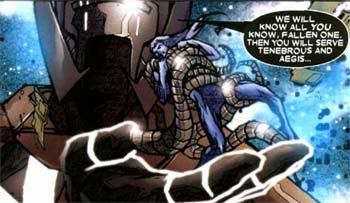
This is why I think, while I’m loathe see it happen all across the MU, a Crisis-esque wiping of the cosmic characters might be just what the doctor ordered. Thin out the gods, re-establish some of them, and make them feel like gods in more than name. If not through some kind of reality-altering story, then just have some mean motherfucker slaughter all but a few (of course, a lot of characters are getting whacked in Annihilation, but mainly heroes and villains, not the the big guys). Using another Star Trek analogy, Q wouldn’t have been as beloved a character if he showed up in every episode, or if every other villain was just as powerful. Likewise, Marvel should use its space gods sparingly. And when the writers do bring in Galactus or Eternity or some other big god guy, it shouldn’t be just to slaughter them. If the focus came off the space gods, maybe it would give the "House of Ideas" more time to develop new heroes (or re-establish old ones) in order to give the cosmic fans an ongoing monthly or two rather than your occasional mini-series.

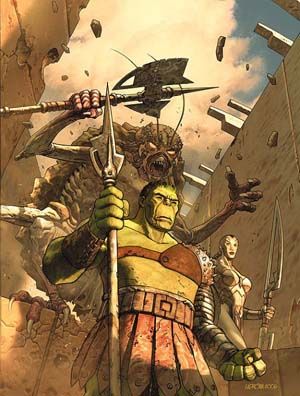
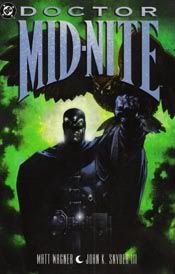 By Matt Wagner, John K. Snyder III, and Ken Bruzenak
By Matt Wagner, John K. Snyder III, and Ken Bruzenak
 Doctor Mid-Nite, thankfully, is no well-oiled ass-kicker. Moments after his first genuine "super" battle – a relatively short tussle with a steroid-amped thug – he collapses in exhaustion. Later in the trade, when another thug shoots at him, he doesn’t duck. He doesn’t leap-frog with ease through a web of bullet motion-lines. He gets. Fucking. SHOT. Even in the end, he fails to completely stop the machinations of the bad guys.
Doctor Mid-Nite, thankfully, is no well-oiled ass-kicker. Moments after his first genuine "super" battle – a relatively short tussle with a steroid-amped thug – he collapses in exhaustion. Later in the trade, when another thug shoots at him, he doesn’t duck. He doesn’t leap-frog with ease through a web of bullet motion-lines. He gets. Fucking. SHOT. Even in the end, he fails to completely stop the machinations of the bad guys. 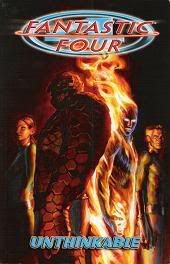 By Mark Waid, Mike Wieringo, Casey Jones, Paul Mounts, Chris Eliopoulus, Rus Wooton, and Paolo Rivera
By Mark Waid, Mike Wieringo, Casey Jones, Paul Mounts, Chris Eliopoulus, Rus Wooton, and Paolo Rivera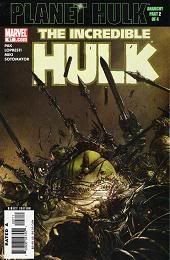 The Incredible Hulk #97
The Incredible Hulk #97